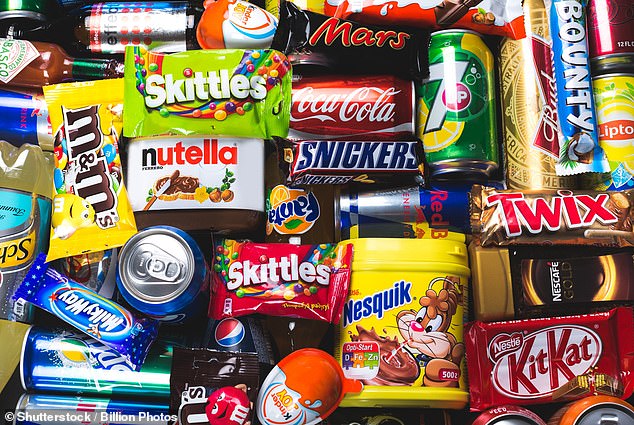
Ultra-processed food IS addictive, scientists confirm – as first-of-its-kind study reveals how consuming it ‘rewires’ the brain
Ultra processed foods have long been linked to obesity, heart disease and dementia but now scientists say regular consumption could physically alter the brain, perpetuating a vicious cycle of overeating.
Evidence suggests these foods—which often contain additives, emulsifiers and preservatives to enhance flavour and prolong shelf life—have contributed to the steady increase of many obesity-related diseases like diabetes, heart disease and dementia.
In the study, published in the journal Nature, experts set out to determine whether these brain changes occur simply as a result of weight gain or through mechanisms independent of obesity.
An international team of scientists analysed brain scans from over 33,000 participants enrolled in the UK Biobank study and found people who ate more ultra-processed foods had significantly altered brains which could explain food addiction.
‘Our findings suggest that higher consumption of ultra processed foods is associated with differences in the brain,’ Professor Arsène Kanyamibwa an expert in brain science at the University of Helsinki and study co-author, explains.
‘These associations could be linked to behavioural patterns such as overeating, though causal relationships cannot be confirmed by our study.
‘The observed associations are not solely explained by inflammation or obesity; ingredients and additives typical to UPFs, such as emulsifiers may also play a role.’
In the study, researchers followed 33,654 middle-age participants who completed an online dietary questionnaire and blood tests around eight years before having a brain scan.
Additive-laden foods such as crisps and sweets have been vilified for decades over their supposed risks, with dozens of studies linking them to type 2 diabetes and other diseases
The questionnaire involved a 24-hour dietary recall consisting of over 200 food items in which participants had to indicate how many portions of each food item they had consumed.
The researchers then estimated energy consumption for each item, excluding any participants who reported consuming extreme amounts of calories—defined as anything less than 500 kcal and more than 5000 kcal.
According to the NHS, the recommended daily calorie intake is around 2,500 kcal for men and 2,000 kcal for women.
On average, participants consumed around 2,608 kcal a day—just over 46 per cent of which came from ultra processed foods.
Foods were then split into four categories using the NOVA system: unprocessed or minimally processed, processed ingredients, processed foods, and ultra-processed foods.
The researchers found that higher ultraprocessed food consumption was associated with brain changes in areas involved in hunger and reward circuits, suggesting that ultraprocessed foods exert effects on the brain beyond just contributing to obesity.
In the hypothalamus—responsible for regulating hunger among other things—eating ultraprocessed foods was associated with lower mean diffusivity, indicating increased cell density and inflammation.
This inflammation can disrupt how the brain regulates hunger, satiety and reward—all of which are central to food addiction.
When the brain’s regulation of hunger is impaired, and its reward circuits are overstimulated, people may crave more of these foods despite being full, and lose control over how much they eat.
The researchers concluded that damage to this brain circuit, involved in food liking and cravings, ‘may favour maladaptive eating, like more ultra processed foods, and metabolic disease, further perpetuating a vicious cycle.’
In brain regions involved in rewards and motivation, however—like the nucleus accumbens and pallidum—eating more ultraprocessed foods was associated with signs of reduced cell density and increased water content.
According to the researchers, these changes could reflect early signs of cognitive decline, brain shrinkage and cell loss—which could weaken self-control around food and reinforce compulsive eating habits.
They concluded: ‘Eating ultraprocessed foods increases several nutrient and metabolic markers of disease and is associated with structural brain changes in areas that regulate eating behaviour.
‘These findings provide insight into how ultraprocessed foods consumption may perpetuate itself while contributing to adverse health effects.’
It comes as research earlier this year found that consuming just an extra 100g of UPFs each day—roughly two packets of crisps—raised the risk of life-threatening heart issues.
In the study, researchers assessed 41 studies spanning North and South America, Europe, Asia and Oceania involving 8,286,940 adults.
They found each additional 100g per day of UPF consumption was associated with a 5.9 per cent increased risk of cardiovascular events.
The findings, presented at the American College of Cardiology (ACC) Asia 2025 conference in Singapore, also showed adults had a 14.5 per cent higher risk of high blood pressure.
The umbrella term UPFs is used to cover anything edible made with colourings, sweeteners and preservatives that extend shelf life.
Ready-meals, ice cream and tomato ketchup are some of the best-loved examples of products that fall under the umbrella UPF term.
This is now synonymous with foods offering little nutritional value.
They are different to processed foods, which are tinkered to make them last longer or enhance their taste, such as cured meat, cheese and fresh bread.
The UK is the worst in Europe for eating UPFs, which make up an estimated 57 per cent of the national diet.
First Appeared on
Source link






